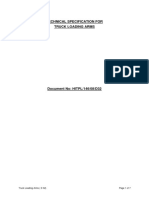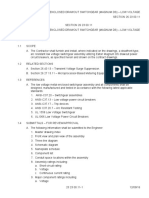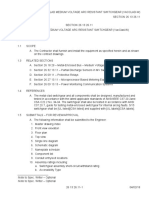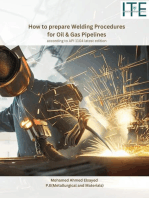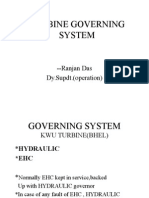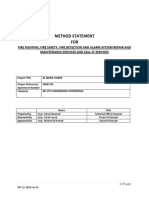Section 14510 - Shaftless Screw Conveyors City of San Diego, CWP Guidelines Part 1 - General
Section 14510 - Shaftless Screw Conveyors City of San Diego, CWP Guidelines Part 1 - General
Uploaded by
cesakzCopyright:
Available Formats
Section 14510 - Shaftless Screw Conveyors City of San Diego, CWP Guidelines Part 1 - General
Section 14510 - Shaftless Screw Conveyors City of San Diego, CWP Guidelines Part 1 - General
Uploaded by
cesakzOriginal Title
Copyright
Available Formats
Share this document
Did you find this document useful?
Is this content inappropriate?
Copyright:
Available Formats
Section 14510 - Shaftless Screw Conveyors City of San Diego, CWP Guidelines Part 1 - General
Section 14510 - Shaftless Screw Conveyors City of San Diego, CWP Guidelines Part 1 - General
Uploaded by
cesakzCopyright:
Available Formats
SECTION 14510 - SHAFTLESS SCREW CONVEYORS
City of San Diego, CWP Guidelines
PART 1 -- GENERAL
1.1 WORK OF THIS SECTION
A. The WORK of this Section includes providing shaftless screw conveyors including electric motors,
drives, controls, instrumentation, and other appurtenances as indicated and required to provide a
complete and operable system with no spillage of sludge.
B. The WORK also requires that one manufacturer be made responsible for furnishing the WORK of this
Section, but without altering or modifying the CONTRACTOR'S responsibilities under the Contract
Documents.
C. The WORK additionally requires that the one responsible manufacturer shall manufacture the principal
elements and components including, as a minimum, the shaftless screw conveyors and troughs and shall
be responsible for the suitability of the equipment for the intended application.
D. The WORK also includes coordination of design, assembly, testing and installation.
1.2 RELATED SECTIONS
A. The WORK of the following Sections applies to the WORK of this Section. Other Sections of the
Specifications, not referenced below, shall also apply to the extent required for proper performance of
this WORK.
1. Section 11000 Equipment General Provisions
2. Section 16485 Local Control Panels
1.3 CODES
A. The WORK of this Section shall comply with the current editions of the following codes as adopted by
the City of San Diego Municipal Code:
1. Uniform Building Code
2. National Electrical Code
1.4 SPECIFICATIONS AND STANDARDS
A. Except as otherwise indicated, the current editions of the following apply to the WORK of this Section:
1. Commercial Standards:
ASTM A 36 Specification for Structural Steel
ASTM A 283 Specification for Low and Intermediate Tensile Strength
Carbon Steel Plates, Shapes and Bars
AISI 8620 Alloy Steel, Hot Rolled and Cold Finished
AWS D1.1 Structural Welding Code - Steel
ANSI/ASME B15.1 Safety Standards for Mechanical Power Transmission
Apparatus
[DECEMBER 1994] SHAFTLESS SCREW CONVEYORS
[CONTRACT NO.] [CONTRACT TITLE] 14510-1
ANSI/ASME B20.1 Safety Standards for Conveyors and Related Equipment
2. Manufacturer's Standards:
Conveyor Equipment Manufacturers Association (CEMA) standards
American Gear Manufacturers Association (AGMA) standards
Institute of Electrical and Electronics Engineers (IEEE) standards
National Electrical Manufacturer's Association (NEMA)
1.5 SHOP DRAWINGS AND SAMPLES
A. The following shall be submitted in compliance with Section 01300:
1. Catalogue cut sheets containing descriptive information and drawings of screw conveyors and their
components.
2. Assembly and installation drawings including shaft size, seal, coupling, anchor bolt plan, parts
nomenclature, material list, outline dimensions and shipping weights.
3. Manufacturer specification sheets for rupture discs.
4. Drive and motor sizes and specifications.
5. Design loadings to be transmitted to foundation or supports.
6. Design calculations showing dead, live, and dynamic loadings for normal and seismic conditions
certified by a registered structural engineer in the State of California.
7. Calculations for stress in the auger corresponding to torsional rating as indicated under "Design
Requirements."
8. Certifications from the manufacturer stating that the equipment complies with this Specification
and the manufacturer accepts responsibility for coordination of all equipment and services required
for proper installation and operation of the installed equipment.
9. Information on at least one successfully performing comparable installation designed and
fabricated in the recent past by the manufacturer responsible for this WORK, along with contact
names, addresses, and telephone numbers.
1.6 OWNER'S MANUAL
A. The following shall be included in the OWNER'S MANUAL in compliance with Section 01300:
1. Technical manuals and spare parts lists.
2. Instructions for field procedures for erection, adjustments, inspection, and testing.
3. Certification that the equipment complies with requirements.
4. Structural calculations for conveyor supports as indicated in paragraph 2.8.
1.7 SERVICES OF MANUFACTURER
[DECEMBER 1994] SHAFTLESS SCREW CONVEYORS
[CONTRACT NO.] [CONTRACT TITLE] 14510-2
A. Inspection, Startup, and Field Adjustment: An authorized service representative of the manufacturer
shall visit the site and witness the following:
1. Installation of the equipment for not less than [2] days.
2. Inspection, checking, and adjusting the equipment for not less than [2] days.
3. Startup and field testing for proper operation for not less than [2] days.
B. Instruction of OWNER'S Personnel: The authorized service representative shall also furnish the
indicated services for instruction of the OWNER'S personnel in the operation and maintenance of the
equipment including step-by-step troubleshooting procedures with necessary test equipment for not less
than [one] day.
1.8 QUALIFICATIONS
$#
NTS: In the paragraph below, define the terms "comparable size and complexity" for the
equipment or system specified. Requiring experience of more than one successful
project requires sound justification and prior written approval from the City Project
Manager.
#$
A. Manufacturer: Company which has supplied at least one successfully performing installation of
comparable size and complexity in the United States in the recent past. Equipment of comparable size
and complexity shall have the following characteristics: [ ].
PART 2 -- PRODUCTS
2.1 DESIGN CRITERIA
A. General: The screw conveyors shall be shaftless, screw-type units designed to transfer dewatered sludge
from the [centrifuges] to the [hopper]. The shaftless screw conveyors and components shall be designed
and constructed in accordance with the Conveyor Equipment Manufacturer's Association (CEMA)
Standard No. 350 and with the schedules at the end of this Section.
B. Safety Requirements: Screw conveyors shall comply with ANSI/ASME Safety Standards B15.1 and
B20.1, as applicable.
C. Each conveyor shall be sized to convey the indicated design material handling rate at 60 percent of the
rated capacity and 30 percent trough filling. The capacity of the drive unit shall equal the rated capacity
of the conveyor.
D. Manufacturer shall demonstrate by submission of calculations that at its torsional rating, the stress in the
extreme fiber of the auger flighting does not exceed 30 percent of the Fy value of the flight material.
Manufacturer shall also demonstrate that at 250 percent of the motor nameplate horsepower, the drive
unit cannot produce more torque that the torsional rating of the flighting.
E. Materials: Materials used in the fabrication of the equipment furnished under this Section shall
conform to the following:
1. Steel plate and shapes - ASTM A36 or A283 Grade D
[DECEMBER 1994] SHAFTLESS SCREW CONVEYORS
[CONTRACT NO.] [CONTRACT TITLE] 14510-3
2. Spiral flights - AISI 8620, cold formed spring steel, minimum hardness
200 Brinell
3. Wear liner - Plastimeric, impregnated with molybdenum disulfide and
silicone oil or stainless steel, Type 316
4. Bolts, nuts, and washers for - Type 304 stainless steel. All threads shall be
conveyor supports and in with "Never Seeze" or equal
contact with sludge
F. Conveyor Nos. [ ] shall be constructed for a design pressure of [15] psig according to ASTM Pressure
Vessel Code.
G. Conveyer Nos. [ ] shall be provided with a jacket for cooling water.
H. Conveyor Nos. [ ] shall be insulated for protection of personnel. Insulation clips shall be provided
on the conveyor shell for attaching the insulation jacket.
2.2 SPIRAL FLIGHTING
A. Spiral flighting for the shaftless screw conveyors shall be designed to convey material without a center
shaft. The spiral flights shall be designed with the stability to prevent distortion and jumping in the
trough.
Spiral flighting shall have full penetration welds at all splice connections. The flights shall be fabricated
and welded on a jig to assure true alignment and shall be assembled according to the manufacturer's
recommendations. The spiral flights shall be welded to the end pipe sleeve. The spiral flights shall be
coupled to the end shafts by a pipe to shaft connection of sufficient strength to transmit thrust and/or
torsion applicable to meet performance criteria.
2.3 END SHAFT CONNECTIONS
A. Spiral flights shall be connected to the end shafts using an end flange and a pipe sleeve to effectively
transmit torque from the drive shaft to the spiral flight. The flange and pipe sleeve shall be welded to
the spiral flights, with welded gusset plates used for additional reinforcing. Bushings shall be used
between the pipe sleeve and the end shaft, if necessary.
2.4 TROUGHS
A. Troughs shall conform to the dimensional standards of CEMA 300 and enclosure classification IIIE.
Each conveyor trough shall be fabricated from a minimum 1/4-inch steel plate. Each trough shall be
equipped with filling and discharge chutes for transferring material to or from another conveyor. Each
filling chute shall be flanged. The chutes shall be fabricated from a minimum 1/4-inch steel plate.
Equal level transfers shall be permitted. A cleanout shall be provided at the low end of the conveyor
trough. Cleanouts shall be 4-inch diameter, suitable for connection to steel drain pipe. The portion of
each trough that is not covered by the filling chute shall be covered by a minimum 12 gauge steel hinged
cover. Covers shall conform to CEMA Standard No. 300-24.
2.5 WEAR LINERS
A. Plastic Liners:
1. The wear liners shall be a plastimeric material that is impregnated with molybdenum disulfide and
silicone oil capable of work hardening to a friction factor of 0.08 or less. The material shall be
[DECEMBER 1994] SHAFTLESS SCREW CONVEYORS
[CONTRACT NO.] [CONTRACT TITLE] 14510-4
attached with Type 316 stainless steel countersunk bolts after the material has been drilled to
accept the fasteners. The fasteners shall be installed on maximum 12-inch centers and a maximum
of 2 inches from the liner top edge.
2. Minimum liner thickness as shall be as follows:
Conveyor Size Liner Thickness
6-inch through 12-inch 1/4-inch
14-inch through 24-inch 3/8-inch
B. Stainless Steel Liners:
1. The liners shall be fabricated of 10 gauge 316 stainless steel, insertable liner conforming to the
inside diameter of the trough, capable of withstanding temperatures up to 250 degrees F. Liner
plates shall extend not less than 3 inches above the horizontal centerline of the conveyors and shall
be bolted or clamped to the conveyor troughs as required for the application.
2. Stainless steel, Type 316, rifling bars with a hardness exceeding Brinell 250 shall be stitch-
welded, to the stainless steel liner plates, parallel to the conveyor centerlines. The rifling bars
shall form the contact surface of the shaftless augers. Spacing between bars shall be 1-1/2 inch
maximum. The bar cross section shall be 2-inch by 1/4-inch minimum. The bars shall cover a
minimum of 180 degrees of the liners.
2.6 RUPTURE DISCS
A. Rupture discs shall be provided on screw conveyors as indicated. Rupture discs shall be made of
stainless steel suitable for cyclic and pulsing duty. The maximum operating temperature and pressure
shall be [250 degrees F] and [2 inches] of water column pressure. The rupture discs' burst pressure shall
be [5] psig.
B. Rupture disc clamps shall be capable of withstanding a minimum of [5] psi more pressure than the
rupture disc rating.
C. Rupture discs mounted on Conveyor Nos. [ ] shall be equipped with rupture detectors. They shall be
monitored and alarmed at the Programmable Logic Controller at the Operator Console.
2.7 CONVEYOR SUPPORTS
A. Each conveyor shall be furnished complete with supports suitable for mounting as indicated and
required. The supports shall be shop fabricated from structural steel shapes and plates. Structural and
support design shall be based on seismic forces for Zone 4 with completely filled conveyor. All shop
welding shall conform to the latest standards of the American Welding Society.
2.8 DRIVE UNITS
A. Each screw conveyor shall be driven by an electric motor connected to a gear reducer. The gear reducer
shall be mounted to the trough end. The drive system shall be designed for starting the conveyor fully
loaded. Drive size shall be as recommended by the manufacturer. All electric motors shall be [totally
enclosed fan cooled, heavy duty]. Drive system components shall be provided such that jamming of any
components do not cause damage to the equipment.
2.9 MOTION DETECTORS
[DECEMBER 1994] SHAFTLESS SCREW CONVEYORS
[CONTRACT NO.] [CONTRACT TITLE] 14510-5
A. A motion switch to detect under speed or zero speed shall be provided with each conveyor. The unit
shall have a time delay to allow the selected machine to accelerate and shall have sufficient range on the
calibration to be able to detect decrease in speed as an alternative to motion failure. The unit shall detect
failure in the forward and reverse directions on the reversible conveyors.
[2.10 EMERGENCY STOP SWITCHES WITH CABLE OPERATORS
A. Provide conveyor with an emergency stop system consisting of pull-cord switches actuated by a cable
system running the full length of both sides of the conveyor. Cables shall be orange colored, plastic-
covered steel aircraft cable. Provide all cable end fittings and all intermediate cable support eyes.
Provide cable support eyes every 10 feet. Provide switches in enclosures which are NEMA rated in
accordance with the area designations of Section 16050. Switches shall limit the required actuating force
to OSHA guidelines. The switches shall be manually set after actuation and shall provide visual
indication of operation. Switches shall be single-pole, double-throw output contact, rated for inductive
load of 5 amps at 120 VAC. Switches shall be normally closed and shall open when pull-cord switches
are actuated. Actuator arms shall be 316 stainless steel.]
[2.11 TORQUE OVERLOAD PROTECTION
A. Torque overload protection shall be provided to protect the drive components and shaftless screws from
torsional loadings exceeding the torsional rating of the shaftless auger. Current transformers shall be
provided and shall sense the current draw of the motor leads. The signals shall be transmitted to the
current overload protection devices, which are set as recommended by the equipment manufacturer.]
2.12 GEAR REDUCERS
A. All gear reducers shall be commercially built, AGMA Class I, single, double, or triple reduction,
helical gear units with high capacity roller bearings. Bearings shall be designed for the thrust loads from
the spiral flights and shall have the AFBMA L-10 life of 100,000 hours. The reducers shall be standard
air-cooled units with no auxiliary cooling allowed. Low speed output shafts shall be chrome plated.
Shaft seals shall be tripled lipseal with taconite packing design for service conditions.
2.13 ADJUSTABLE FREQUENCY AC DRIVES
A. The following conveyors shall be provided with adjustable frequency drives:
Conveyor Nos.: [ ], [ ], [ ], [ ], [ ], [ ]
B. Adjustable frequency PWM (Pulse Width Modulating) AC drives shall be provided to control the speed
of the AC drive motor required by the conveyor speed range. Speed reducing gear boxes shall be
provided as required to deliver the necessary torque and acceleration required by the conveyors.
C. Enclosure: The AC drives shall be installed in a NEMA 4X enclosure which shall be purged with
nitrogen. The enclosure shall have a 1/2-inch NPT female connection for nitrogen purge. The
enclosure shall be sized to dissipate the heat generated internally,but shall not be larger than 24 inches
by 24 inches by 12 inches deep. The following items shall be mounted on the enclosure door:
1. Power disconnect handle
2. Emergency stop pushbutton
3. AC drive running status light
D. Controls: The AC drives shall have local and remote control modes selected by local-remote switches
located in the AC drives enclosures. The normal mode of operation shall be remote by a programmable
logic controller (PLC). In the remote mode, VFDs shall interface with the PLC as follows:
[SEPTEMBER 1993] SHAFTLESS SCREW CONVEYORS
[CONTRACT NO.] [CONTRACT TITLE] 14510-6
1. PLC provides a START/STOP contact closure command.
2. PLC provides 4-20 mA analog signal for the conveyor speed control. The 4-20 mA analog signal
shall be proportional to the conveyor rpm range.
3. The AC drive provides 4-20 mA analog signal representative of conveyor speed.
4. The AC drive provides a contact closure common alarm representative of AC drive or motor
malfunction.
5. The AC drive provides contact closure for indication of the local-remote switch position.
E. The microprocessor-based controls shall include the following adjustable control functions entered via
the AC drive keyboard:
1. Motor/conveyor rpm
2. Minimum speed
3. Maximum speed
4. Gain adjustment
5. Acceleration
6. Deceleration
7. Current trip
8. Torque limit
9. Signal span
10. Low frequency boost
11. Volts/Hertz
12. LED/LCD status indicator programmed to display conveyor rpm
Speed indicator shall not require the use of a tachometer generator.
F. AC Drive Controllers: The AC drive controllers shall be all solid state inverters utilizing silicon
semiconductors and transistors which shall be standard catalog items of the device manufacturer. The
power circuits shall consist of a phase controlled rectifier, a filter choke, and an auto-sequential force
of auxiliary communicated inverter.
The inverter output voltages shall be controlled such that they vary directly proportional to the output
frequencies. The solid state AC drives shall be capable of attaining efficiencies in excess of 95 percent
at full speed and in excess in 80 percent at 50 percent speed.
The AC drives shall be designed to operate at full output power over the maximum specified input
voltages and frequency fluctuations, in ambient conditions indicated. No external venting or heat
exchangers shall be required. The AC drives shall operate from 480 volt, 3-phase, 3-wire, 60 Hertz
input power.
Normal operation shall not be affected by input power fluctuations between plus or minus 10 percent
voltage and plus or minus 2 Hertz. Voltage regulations shall be plus or minus 1 percent of setpoint
voltage. Speed regulation shall be 1 percent of full speed due to variables other than motor load.
The AC drives shall be equipped with a diagnostic system capable of troubleshooting problems down
to a component replacement level, as well as being able to monitor inverter output, process input, and
power line parameters. In addition, an indication shall be provided for each protective function to show
an "actuated" status, malfunction, or trouble.
G. Protective Devices: The AC drives shall have transient surge protection to a minimum of 10,000 volt,
50 joules, without failure. They shall meet or exceed the Institute of Electrical and Electronic Engineers
(IEEE) Surge Withstand Capability Test, IEEE Std. 472 without failure. For the purposes of this
Section, failure is defined as loss of components in the AC drive, including power semiconductors, logic
components, or fuses.
[SEPTEMBER 1993] SHAFTLESS SCREW CONVEYORS
[CONTRACT NO.] [CONTRACT TITLE] 14510-7
H. The AC drive controllers shall be furnished with the following protective functions, as applicable:
1. Short circuited output (instantaneous over-current)
2. Live to ground faults
3. Overload
4. Reverse phase sequence of input power
5. Single-phase input power
6. Power outage or dips in input power (under voltage)
7. Communication overcurrent
8. DC link overvoltage
9. Cabinet over temperature
10. Changes in volts/Hertz constant
11. Inverter fault
2.14 BEARINGS AND END SHAFTS
A. When recommended by the manufacturer, bearings shall be provided on both ends of each conveyor.
End bearings shall be double pillow block and shall be mounted outside the conveyor trough. Bearings
shall be completely serviceable from outside the conveyor. Intermediate bearings will not be allowed.
A plate-type lipseal shall be provided around the shaft where the shaft passes through the trough ends.
The bearing and seals shall be capable of supporting the applicable thrust loads by means of snap rings
and shall prevent angular misalignment of the shafts. Bearings shall have an L-10 life of 100,000 hours.
2.15 HOLDDOWN PROVISIONS
A. Holddown devices shall be installed on the shaftless screw conveyors if required by the manufacturer's
design or if excessive vertical movement of the spiral flights occurs during the first year of operation.
Evidence of excessive vertical movement shall include wear on the trough cover plates. Holddown
devices shall be of welded steel construction supported by the conveyor trough, and be designed to
minimize material flow interruption. The holddown devices shall be designed by the manufacturer.
2.16 STRUCTURAL
A. The ratio of the unbraced length to least radius of gyration (slenderness ratio) shall not exceed 120 for
a compression member and shall not exceed 240 for any tension member (of angles about the Z-Z axis).
In addition, all structural members and connections shall be designed so that the unit stresses will not
exceed AISC allowable stresses by more than 1/3 when subject to loading of twice the running torque
of the drive motor.
2.17 SUPPORTS
A. Supports shall be provided within 2 feet of the drive units and at locations no more than 12 feet apart
along the conveyor. Support loads shall be based on a completely filled trough plus dead weight of the
equipment designed for Zone 4 seismic forces as per UBC.
2.18 NAMEPLATES, TOOLS AND SPARE PARTS
A. Spare Parts: The WORK also includes furnishing the following spare parts for each conveyor:
1. [Four] sets of shaft packing material (if used)
2. [One] packing gland follower (if used)
3. [One] gear reducer (if used)
4. [One] set of belts or chains (if used)
5. [One] bearing of each size
6. [One] safety switch (if used)
[SEPTEMBER 1993] SHAFTLESS SCREW CONVEYORS
[CONTRACT NO.] [CONTRACT TITLE] 14510-8
2.19 FACTORY TESTING
A. The conveyor drive system shall be assembled and given no-load running tests at the manufacturer's
plant before shipment.
B. The OWNER and the CONSTRUCTION MANAGER (at the option of either) reserve the right to
witness factory tests. The CONTRACTOR shall notify the CONSTRUCTION MANAGER 2 weeks
in advance of the testing date.
2.20 MANUFACTURERS
A. Products shall be of the following manufacture, type or model, as indicated (or equal):
1. Shaftless screw conveyors:
Purac Engineering, Inc.
2. Gear reducers:
SEW Eurodrive
Nord Gear
Falk
3. Zero speed switches:
Magnetic Pickup: Airpax, "Part No. 70087-3040-007"
Amplifier Speed Switch: Airpax, "Part No. T77130-8-000"
4. AC drives:
Allen Bradley, "Bulletin 1336"
Eaton Dynamics, "Model AF-5000+"
5. Plastic wear liners:
Dura Ware Corporation, "Dura Slide Xylethnon"
6. Motion detectors:
Milltronics
[7. Emergency stop switches:
Conveyor Control Corporation
Crouse-Hinds]
[8. Torque overload protection devices and current transformers:
Tsubaki ]
PART 3 -- EXECUTION
3.1 INSTALLATION
A. All sections and loose items shall be match-marked prior to shipping.
B. Installation shall be in accordance with the manufacturer's installation requirements.
3.2 FIELD TESTS
A. The equipment shall be field tested after installation to demonstrate satisfactory operation without
causing excessive noise, vibration, and overheating of the bearings. The field testing shall be performed
[SEPTEMBER 1993] SHAFTLESS SCREW CONVEYORS
[CONTRACT NO.] [CONTRACT TITLE] 14510-9
by an experienced field representative of the manufacturer of each major item of equipment, who shall
supervise the following tasks and shall certify in writing that the equipment and controls have been
properly installed, aligned, lubricated, adjusted, and readied for operation:
1. Start up, check, and operate the equipment over the entire speed range.
2. Bearing temperatures shall be determined by a contact-type thermometer. A running time of at
least 20 minutes shall be maintained for this test without an excessive temperature rise that would
be detrimental to the bearing.
3. The field testing will be witnessed by the CONSTRUCTION MANAGER. In the event any of
the equipment fails to meet the above test requirements, it shall be modified and retested until it
meets the requirements of these Specifications. The manufacturer shall then certify in writing that
the equipment has been satisfactorily tested, and that all final adjustments thereto have been made.
Certification shall include the date of the final acceptance test and a listing of all persons present
during tests, and resulting test data. The costs of all work performed in this paragraph by factory-
trained representative shall be borne by the CONTRACTOR. The OWNER will pay for costs of
power and water.
SCHEDULE
SCREW CONVEYOR NOS. [ ], [ ]
No. of units - [ ]
Capacity, lbs/hr - [ ]
Screw diameter, inches - [ ]
Pitch, inches - [ ]
Length, feet-inches - [ ][ ]
Incline, degrees - [ ]
Trough - ["U" shaped with bolted cover] [ ]
Wear liner - [stainless steel] [plastimeric]
Hours of operation - [continuous 24 hrs] [ ]
Power supply - [3 phase, 60 Hz, 480 V]
Material conveyed - [dewatered sludge 45% solids] [dried sludge 90% solids] [
]
Density, lbs/cu ft - [ ]
Temperature, degrees F - [ ]
Special requirements - [reversible conveyor]
[jacketed trough for cooling water]
[insulated trough for personnel protection]
[ ]
[SEPTEMBER 1993] SHAFTLESS SCREW CONVEYORS
[CONTRACT NO.] [CONTRACT TITLE] 14510-10
** END OF SECTION **
[SEPTEMBER 1993] SHAFTLESS SCREW CONVEYORS
[CONTRACT NO.] [CONTRACT TITLE] 14510-11
You might also like
- MELCs For TLE ICT CSS G9Document4 pagesMELCs For TLE ICT CSS G9Catherine Ilagan85% (39)
- Reciprocating Rake Bar ScreensDocument10 pagesReciprocating Rake Bar ScreensAstiien Artsen AsyariiNo ratings yet
- Apron FeederDocument10 pagesApron FeederKenny Ruiz100% (1)
- Truck Loading Arms (D 32)Document7 pagesTruck Loading Arms (D 32)Elias EliasNo ratings yet
- Section 11398 - Dissolved Air Flotation Thickeners City of San Diego, CWP Guidelines 1 - GeneralDocument24 pagesSection 11398 - Dissolved Air Flotation Thickeners City of San Diego, CWP Guidelines 1 - Generalburak kasapNo ratings yet
- Primary Clarifier MechanismDocument12 pagesPrimary Clarifier MechanismKriztopher Urrutia100% (1)
- Maqam Al Nabii Musa Mechanical Book of SpecificationsDocument323 pagesMaqam Al Nabii Musa Mechanical Book of SpecificationsSolidr ArchitectsNo ratings yet
- 606 Division 11 - Equipment PDFDocument38 pages606 Division 11 - Equipment PDFFahruddin UdinNo ratings yet
- 43 00 00 - LPG InstallationDocument13 pages43 00 00 - LPG InstallationNiong David100% (2)
- 05450-Pre Engineered Metal TrussesDocument4 pages05450-Pre Engineered Metal TrussesRamsey RasmeyNo ratings yet
- Section 02651 - Steel Pipe, Lined and Coated City of San Diego, CWP GuidelinesDocument23 pagesSection 02651 - Steel Pipe, Lined and Coated City of San Diego, CWP GuidelinesMohammed HarrisNo ratings yet
- GET6600G Section 10 Guide Form Spec Rev 2Document14 pagesGET6600G Section 10 Guide Form Spec Rev 2NestorNateraNo ratings yet
- Section 13206 - Pressurized Steel Tanks City of San Diego, CWP Guidelines Part 1 - GeneralDocument5 pagesSection 13206 - Pressurized Steel Tanks City of San Diego, CWP Guidelines Part 1 - Generalkjpatel2No ratings yet
- Project Standard Specification: Packaged Cooling Towers 15640 - Page 1/9Document9 pagesProject Standard Specification: Packaged Cooling Towers 15640 - Page 1/9adel rihanaNo ratings yet
- A Guid To HVACDocument11 pagesA Guid To HVACHamad GulNo ratings yet
- Project Standard Specification: Sewage Pumps 15445 - Page 1/12Document12 pagesProject Standard Specification: Sewage Pumps 15445 - Page 1/12adel rihanaNo ratings yet
- 14240FL ThyssenKruppDocument21 pages14240FL ThyssenKruppManish Singh50% (2)
- Spec 2Document637 pagesSpec 2Waqar KhanNo ratings yet
- 26 23 00.11 SWITCHGEAR ARC RESISTANT LOW VOLTAGE METAL ENCLOSED DRAWOUT 9 Jan 18Document16 pages26 23 00.11 SWITCHGEAR ARC RESISTANT LOW VOLTAGE METAL ENCLOSED DRAWOUT 9 Jan 18Wendy PintoNo ratings yet
- Fall Protection Equipment Systems: Section 07700 Roof Specialties and AccessoriesDocument14 pagesFall Protection Equipment Systems: Section 07700 Roof Specialties and AccessoriesDeana WhiteNo ratings yet
- Vibration Isolation - RevDocument3 pagesVibration Isolation - RevLuis Gabriel BautistaNo ratings yet
- Package SubstationDocument9 pagesPackage SubstationuddinnadeemNo ratings yet
- SECTION 13 05 41 Seismic Restraint Requirements For Non-Structural ComponentsDocument9 pagesSECTION 13 05 41 Seismic Restraint Requirements For Non-Structural ComponentsAnonymous P73cUg73LNo ratings yet
- Manuscript - Apc - Guide - Spec - AC - 2-24-2022 For PublishDocument40 pagesManuscript - Apc - Guide - Spec - AC - 2-24-2022 For PublishemlNo ratings yet
- 23 6418 Oil Free Centrifugal Water Chillers 111001Document11 pages23 6418 Oil Free Centrifugal Water Chillers 111001Mohd RizalNo ratings yet
- Eaton Guidespec Ats Bypass Iso Power Frame Atc900 All Frames 26 36 23 09Document19 pagesEaton Guidespec Ats Bypass Iso Power Frame Atc900 All Frames 26 36 23 09Skycoster MirandaNo ratings yet
- Coarse Bar Screen (Influent PS - RR WWTP)Document12 pagesCoarse Bar Screen (Influent PS - RR WWTP)sauroNo ratings yet
- Eaton Guidespec Tranformers Dry Type Integrated Breaker 26-22-13 11Document10 pagesEaton Guidespec Tranformers Dry Type Integrated Breaker 26-22-13 11fw6b6cgkfsNo ratings yet
- LN11526 - Dewatering Centrifuge EquipmentDocument32 pagesLN11526 - Dewatering Centrifuge Equipmenttomo tomoNo ratings yet
- Manuscript - Apc - Guide - Spec - AD - 2-24-2022 For PublishDocument38 pagesManuscript - Apc - Guide - Spec - AD - 2-24-2022 For PublishemlNo ratings yet
- HVAC Power Ventilators SpecsDocument15 pagesHVAC Power Ventilators SpecsMuhammad GoudaNo ratings yet
- Hamad International Airport Jet Fuel System Expansion: 00 31/01/2019 Issued For Construction Ms LW LW DPDocument29 pagesHamad International Airport Jet Fuel System Expansion: 00 31/01/2019 Issued For Construction Ms LW LW DPsrp. mohammedNo ratings yet
- Medium Voltage, 27KV and 38KV, Metal-Clad Switchgear Spec SDocument14 pagesMedium Voltage, 27KV and 38KV, Metal-Clad Switchgear Spec SJuvencio MolinaNo ratings yet
- Commercial-Duty Velino SpecDocument11 pagesCommercial-Duty Velino SpecRayNo ratings yet
- C. Specifications For Cone Roof TKDocument21 pagesC. Specifications For Cone Roof TKFajar Sidiq AliwiyonoNo ratings yet
- Arc Resistant MV Metal Clad SWGR 040218Document18 pagesArc Resistant MV Metal Clad SWGR 040218Luis BaqueNo ratings yet
- Drainage & Sump Pumps Specs PDFDocument25 pagesDrainage & Sump Pumps Specs PDFWalid El Ghonamy100% (1)
- PCI Guide Specification ArchitecturalDocument45 pagesPCI Guide Specification ArchitecturalLikhon BiswasNo ratings yet
- P KG Waste Water TreatmentDocument28 pagesP KG Waste Water TreatmentsoetrisnoNo ratings yet
- Edotco Technical Specifications - Lamp Pole - BD Rev20210817Document20 pagesEdotco Technical Specifications - Lamp Pole - BD Rev20210817Shazid-ul Alam ShishirNo ratings yet
- Section: Power Factor Correction Square D Varset™ by Schneider ElectricDocument9 pagesSection: Power Factor Correction Square D Varset™ by Schneider ElectricGem EscalanteNo ratings yet
- Hamad International Airport: 00 03.02.19 Issued For Construction He AtmbcmDocument11 pagesHamad International Airport: 00 03.02.19 Issued For Construction He AtmbcmArun KumarNo ratings yet
- Computer-Room Air ConditionersDocument19 pagesComputer-Room Air ConditionersAbdullah.N FAAliNo ratings yet
- Eaton Guidespec Switchgear Low Voltage Metal Enclosed 26-23-00Document16 pagesEaton Guidespec Switchgear Low Voltage Metal Enclosed 26-23-00Mosa Elnaid ElnaidNo ratings yet
- Project Standard Specification: Sump Pumps 15446 - Page 1/10Document10 pagesProject Standard Specification: Sump Pumps 15446 - Page 1/10adel rihanaNo ratings yet
- Is 3177 1977Document66 pagesIs 3177 1977Avijit Dey100% (1)
- Panel BoardDocument7 pagesPanel BoarduddinnadeemNo ratings yet
- This Product Masterspec Section Modifies The Original Masterspec Text, and Does Not Include The Full Content of The Original Masterspec SectionDocument32 pagesThis Product Masterspec Section Modifies The Original Masterspec Text, and Does Not Include The Full Content of The Original Masterspec Sectionabdullah sahibNo ratings yet
- 32 31 00safDocument13 pages32 31 00safbrian walter abarintosNo ratings yet
- 15785-Pca Air Handling UnitsDocument10 pages15785-Pca Air Handling Unitsadel rihanaNo ratings yet
- 1 - . - Hot Dip Galvanizing AESS, Where Indicated, Is Specified in Section 05 05 156. - . - 1Document10 pages1 - . - Hot Dip Galvanizing AESS, Where Indicated, Is Specified in Section 05 05 156. - . - 1Jagatheesh RadhakrishnanNo ratings yet
- Project Standard Specification: Metal Ducts 15815 - Page 1/12Document12 pagesProject Standard Specification: Metal Ducts 15815 - Page 1/12adel rihanaNo ratings yet
- Construction Standard FOR Installation, Testing, Adjusting AND Commissioning of Hvac&R Systems Original Edition JULY 1995Document30 pagesConstruction Standard FOR Installation, Testing, Adjusting AND Commissioning of Hvac&R Systems Original Edition JULY 1995alikealiNo ratings yet
- CamContain FB Housing Master Specification Last Updated 9-15-17Document19 pagesCamContain FB Housing Master Specification Last Updated 9-15-17steeve.spectrumNo ratings yet
- Seismic Requirements - MSTDocument4 pagesSeismic Requirements - MSTwafikmh4No ratings yet
- Clad-Lined Line PipeDocument21 pagesClad-Lined Line PipeAdvis100% (2)
- FL - Hydraulic Elevators - ThyssenkruppDocument19 pagesFL - Hydraulic Elevators - ThyssenkruppCham Amirruddin100% (1)
- Chlorination Equipment - MSTDocument20 pagesChlorination Equipment - MSTwafikmh4No ratings yet
- Duct Works & AccessoriesDocument5 pagesDuct Works & AccessoriesphilipyapNo ratings yet
- How to prepare Welding Procedures for Oil & Gas PipelinesFrom EverandHow to prepare Welding Procedures for Oil & Gas PipelinesRating: 5 out of 5 stars5/5 (1)
- Spot Welding Interview Success: An Introduction to Spot WeldingFrom EverandSpot Welding Interview Success: An Introduction to Spot WeldingNo ratings yet
- Simple Process Control Loop (With Negative Feedback)Document55 pagesSimple Process Control Loop (With Negative Feedback)Ankan Bhunia100% (1)
- Maph01 - MANUAL PH7685.010 Rev BDocument54 pagesMaph01 - MANUAL PH7685.010 Rev BJulio Joel Cortez TelloNo ratings yet
- Debashis GhoshDocument3 pagesDebashis GhoshdebashisNo ratings yet
- Tga D3 800TVDocument1 pageTga D3 800TVJulian Andres VictoriaNo ratings yet
- Service Manual - KENZA 240 - V BETA 03-02-2010Document78 pagesService Manual - KENZA 240 - V BETA 03-02-2010ngovantienNo ratings yet
- CRB Whitepaper Vapor Hydrogen Peroxide Decontamination WebDocument8 pagesCRB Whitepaper Vapor Hydrogen Peroxide Decontamination WebVictor LeiNo ratings yet
- Omnify Sales Process For Swimming Pools by Vipul JhaDocument16 pagesOmnify Sales Process For Swimming Pools by Vipul JhaAshana JhaNo ratings yet
- Governing SystemDocument24 pagesGoverning Systemlrpatra100% (1)
- Ycc365 Plus Smart HD Camera ManualDocument13 pagesYcc365 Plus Smart HD Camera ManualivanNo ratings yet
- Reservoir Vs Well: A Reservoir May Contain Many Wells It Is Possible That in The Same Reservoir Some Wells Might BeDocument17 pagesReservoir Vs Well: A Reservoir May Contain Many Wells It Is Possible That in The Same Reservoir Some Wells Might Beved vyasNo ratings yet
- WastelandDocument6 pagesWastelandmortis123No ratings yet
- Hebei Chengrui Rubber Hose FactoryDocument5 pagesHebei Chengrui Rubber Hose Factoryjixie936No ratings yet
- Speed Control of BLDC Motor Using DSP: 1 4 1 JNTUH Hyderabad, India 2 JNTUH Hyderabad, IndiaDocument5 pagesSpeed Control of BLDC Motor Using DSP: 1 4 1 JNTUH Hyderabad, India 2 JNTUH Hyderabad, IndiapravnkumarNo ratings yet
- Calendar L1Document6 pagesCalendar L1wmuNo ratings yet
- Chapter 3 ETAP User Guide 7 5 2Document75 pagesChapter 3 ETAP User Guide 7 5 2taiayambusuNo ratings yet
- Unit 1-1Document24 pagesUnit 1-1ramalakshmi1712003No ratings yet
- Booklet On EEE Was Updating 2021 2 11bd31e17aDocument50 pagesBooklet On EEE Was Updating 2021 2 11bd31e17aMVLNo ratings yet
- عرض تقديمي من Microsoft PowerPoint جديدDocument2 pagesعرض تقديمي من Microsoft PowerPoint جديدمحمد سمورNo ratings yet
- Kitchen EquipmentsDocument30 pagesKitchen EquipmentsJEYES BELMENNo ratings yet
- SEE Electrical V7 Crack PDFDocument3 pagesSEE Electrical V7 Crack PDFValerieNo ratings yet
- Software ConnectorsDocument6 pagesSoftware ConnectorssanketskumarNo ratings yet
- Cat E5000 07Document44 pagesCat E5000 07Kevin DaughtonNo ratings yet
- Concept and Types of Foreign CollobarationsDocument6 pagesConcept and Types of Foreign CollobarationsYash PunjabiNo ratings yet
- Install Guide IO-R-16Document20 pagesInstall Guide IO-R-16Gabriel FlorNo ratings yet
- Svce - Ece - Iii-I - MPMC Mid-1 Set-BDocument3 pagesSvce - Ece - Iii-I - MPMC Mid-1 Set-BSureshbabu PNo ratings yet
- LogDocument5 pagesLogNa NaNo ratings yet
- SSRN Id38085421Document21 pagesSSRN Id38085421Jay Ram JadavNo ratings yet
- Nantawan Gantong: ProfileDocument2 pagesNantawan Gantong: ProfileTJ GantongNo ratings yet
- Method Statement FinalDocument11 pagesMethod Statement FinalAbdo okashaNo ratings yet



